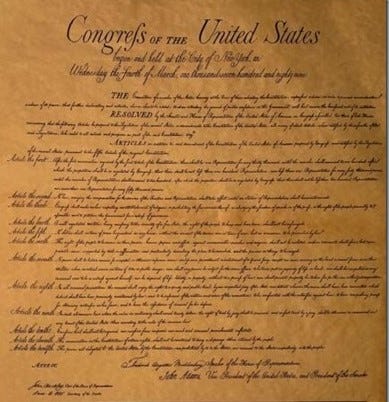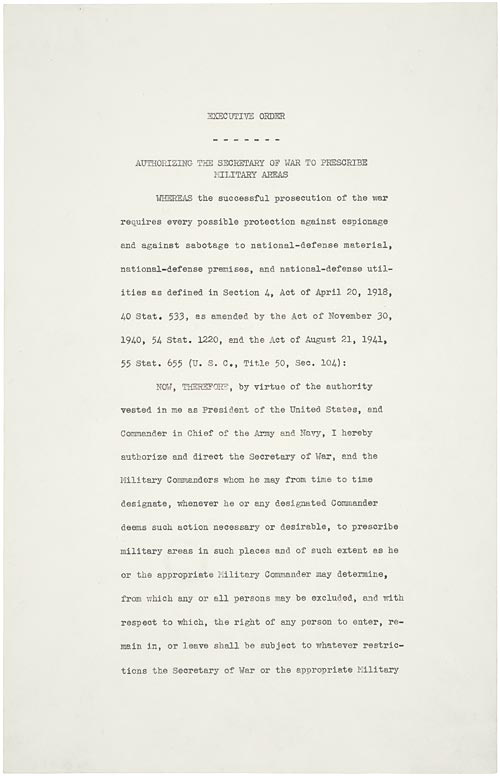The Bill of Rights: Part I
How many still apply? If suspended, by WHOSE authority?
After the Constitution was signed on Sept. 17, 1787, states were not convinced that the Constitution as written would keep government in check and insisted on the addition of a “Bill of Rights” ratified Dec. 15, 1791, to further define the limit of government power:
Amendment I
Congress shall make no law respecting an establishment of religion, or prohibiting the free exercise thereof; or abridging the freedom of speech, or of the press; or the right of the people peaceably to assemble, and to petition the Government for a redress of grievances.
Amendment II
A well regulated Militia, being necessary to the security of a free State, the right of the people to keep and bear Arms, shall not be infringed.
Amendment III
No Soldier shall, in time of peace be quartered in any house, without the consent of the Owner, nor in time of war, but in a manner to be prescribed by law.
Amendment IV
The right of the people to be secure in their persons, houses, papers, and effects, against unreasonable searches and seizures, shall not be violated, and no Warrants shall issue, but upon probable cause, supported by Oath or affirmation, and particularly describing the place to be searched, and the persons or things to be seized.
Amendment V
No person shall be held to answer for a capital, or otherwise infamous crime, unless on a presentment or indictment of a Grand Jury, except in cases arising in the land or naval forces, or in the Militia, when in actual service in time of War or public danger; nor shall any person be subject for the same offence to be twice put in jeopardy of life or limb; nor shall be compelled in any criminal case to be a witness against himself, nor be deprived of life, liberty, or property, without due process of law; nor shall private property be taken for public use, without just compensation.
Amendment VI
In all criminal prosecutions, the accused shall enjoy the right to a speedy and public trial, by an impartial jury of the State and district wherein the crime shall have been committed, which district shall have been previously ascertained by law, and to be informed of the nature and cause of the accusation; to be confronted with the witnesses against him; to have compulsory process for obtaining witnesses in his favor, and to have the Assistance of Counsel for his defence.
Amendment VII
In Suits at common law, where the value in controversy shall exceed twenty dollars, the right of trial by jury shall be preserved, and no fact tried by a jury, shall be otherwise re-examined in any Court of the United States, than according to the rules of the common law.
Amendment VIII
Excessive bail shall not be required, nor excessive fines imposed, nor cruel and unusual punishments inflicted.
Amendment IX
The enumeration in the Constitution, of certain rights, shall not be construed to deny or disparage others retained by the people.
Amendment X
The powers not delegated to the United States by the Constitution, nor prohibited by it to the States, are reserved to the States respectively, or to the people.
Contrary to Biden's and others Constitutionally illiterate's opinions, Rights are absolute!
How long did it take for the Bill of Rights to be violated?
Alien and Sedition Acts 1798
The three so-called Alien Acts made it difficult to become a naturalized citizen and gave the president power to deport without trial aliens he considered threatening. The sweeping language of the Sedition Act made it illegal, among other actions, to “write, print, utter or publish...any false, scandalous and malicious writing...with intent to defame the...government” or “to stir up sedition within the United States.” The acts were set to expire on March 3, 1801.
Federalist judges enforced the law with vigor. There were twenty-five arrests, fifteen indictments, and ten convictions, many upon charges so flimsy as to be comical. Targets of the act tended to be the editors of Democratic-Republican newspapers who criticized the Federalist administration of President John Adams.
In a flash-forward to today’s double-speak:
The Federalists argued that the Sedition Act in reality expanded civil liberties.
Republicans countered that the Constitution expressly delegates no power to regulate speech or the press and that such powers are in no sense necessary and proper. The First Amendment, they argued, specifically prohibits the making of any law whatsoever regarding speech or the press.
As you can see, violations of the Bill of Rights began almost from the start of America. I will illustrate the ones I consider the most egregious.
President Abraham Lincoln
Did President Abraham Lincoln violate the Constitution and the Bill of Rights? There are two schools on that. In his book, “Lincolns Constitution”, by Daniel Faber, the author argues the states did not have a right of secession, and considering the dire circumstances, President Lincoln had the power to even suspend the “Writ of Habius Corpus”, literal translation, “you have the body”, which is:
a writ requiring a person under arrest to be brought before a judge or into court, especially to secure the person's release unless lawful grounds are shown for their detention:
THE basis of our legal system!
The other school of thought is the states absolutely had a right to secede so a war to keep them was definitely unconstitutional and declaring one treason for warring against the states. They probably would have eventually come back to the Union because the South lacked the heavy industry that made their farm equipment.
Lincoln is said to have far exceeded his power as President. He:
Suspended the Writ of Habius Corpus, which according to Article 1, Section 9 of the Constitution only the Legislature has the power to do.
Jailed newspaper editors and shut down hundreds of newspapers.
Arrested Maryland state legislators. Arrested the City Council, Mayor and Police Chief of Baltimore.
Issued an arrest warrant for Ohio Congressman Clement Vallandigham for speaking out against him.
Sent troops door to door in Maryland to seize weapons.
Issued an arrest warrant never served for U.S. Supreme Court Chief Justice Roger B. Taney who ruled he violated the Constitution suspending the Writ of Habius Corpus. The account is from Ward Hill Lamon, Lincoln's friend, bodyguard, and United States Marshal for the District of Columbia during his administration, which various sources have tried to debunk.
Had men kidnapped off the street to be soldiers in the Union army.
Had thousands of Maryland citizens arrested and held in Military prisons, without trial, some of them for years.
Quoting the late, great, American economist, commentator, and academic, Walter E. Williams on Lincoln:
In an 1858 letter, Lincoln said, “I have declared a thousand times, and now repeat that, in my opinion neither the General Government, nor any other power outside of the slave states, can constitutionally or rightfully interfere with slaves or slavery where it already exists.” In a Springfield, Ill., speech, he explained, “My declarations upon this subject of negro slavery may be misrepresented, but can not be misunderstood. I have said that I do not understand the Declaration (of Independence) to mean that all men were created equal in all respects.” Debating with Sen. Stephen Douglas, Lincoln said, “I am not, nor ever have been, in favor of … making voters or jurors of Negroes nor of qualifying them to hold office nor to intermarry with white people; and I will say in addition to this that there is a physical difference between the white and black races, which I believe will forever forbid the two races living together on terms of social and political equality.”
You say, “His Emancipation Proclamation freed the slaves! That proves he was against slavery.” Lincoln’s words: “I view the matter (Emancipation Proclamation) as a practical war measure, to be decided upon according to the advantages or disadvantages it may offer to the suppression of the rebellion.” He also wrote: “I will also concede that emancipation would help us in Europe and convince them that we are incited by something more than ambition.” At the time Lincoln wrote the proclamation, war was going badly for the Union. London and Paris were considering recognizing the Confederacy and considering assisting it in its war effort.
The Emancipation Proclamation was not a universal declaration. It detailed where slaves were freed, only in those states “in rebellion against the United States.” Slaves remained slaves in states not in rebellion – such as Kentucky, Maryland and Delaware. The hypocrisy of the Emancipation Proclamation came in for heavy criticism. Lincoln’s own secretary of state, William Seward, said, “We show our sympathy with slavery by emancipating slaves where we cannot reach them and holding them in bondage where we can set them free.”
Lincoln did articulate a view of secession that would have been welcomed in 1776: “Any people anywhere, being inclined and having the power, have the right to rise up and shake off the existing government and form a new one that suits them better. … Nor is this right confined to cases in which the whole people of an existing government may choose to exercise it. Any portion of such people that can may revolutionize and make their own of so much of the territory as they inhabit.” But that was Lincoln’s 1848 speech in the U.S. House of Representatives regarding the war with Mexico and the secession of Texas.
Why didn’t Lincoln feel the same about Southern secession? Following the money might help with an answer. Throughout most of our history, the only sources of federal revenue were excise taxes and tariffs. During the 1850s, tariffs amounted to 90 percent of federal revenue. Southern ports paid 75 percent of tariffs in 1859. What “responsible” politician would let that much revenue go?
Dred Scott v Sanford case of 1857 aka “Dred Scott decision”
Dred Scott was a slave owned by William Emerson who resided in Missouri, a slave state. Emerson took Scott with him to Illinois, a free state and the Wisconsin territory for four years. While there, Scott met and married Harriet Robinson. Emerson met and married Eliza Irene Sanford when transferred to Louisiana. The Emerson’s took Dred and Harriet Scott back to Missouri, where Emerson later died. Scott tried to purchase their freedom from Emerson's widow, who refused. Eventually with the help of abolitionist lawyers, they sued Mrs. Emerson on the grounds that since they were previously living in a free state, they should be free. The first case heard by the Missouri circuit court which upheld the precedent of "once free, always free". This was eventually overturned by the Missouri State Supreme Court, which ruled their state was not obligated to abide by other states rules. Scott should have filed in Wisconsin territory.
The Scott's ownership was eventually transferred to John F. A. Sanford, Mrs. Emerson's brother, a resident of New York. The Scotts lost in Federal court and appealed to the Supreme Court, Dred Scott v Sandford. Incidentally, “Sanford” is misspelled due to a clerical error.
Chief Justice Roger B. Taney, who crossed swords with Lincoln, wrote the majority opinion. It stated that black people, whether free or enslaved, could not be American citizens and were constitutionally unable to sue for citizenship in the federal courts. The U.S. government had no authority to regulate slavery in its states or territories and since slaves were property, freeing them would violate the owner's Fifth Amendment rights of due process.
What eventually overturned, so to speak, the decision was the Civil Rights Bill of 1866, which mandated that:
all persons born in the United States," with the exception of American Indians, were "hereby declared to be citizens of the United States." The legislation granted all citizens the “full and equal benefit of all laws and proceedings for the security of person and property.
And the Fourteenth Amendment of 1868, Section 1:
All persons born or naturalized in the United States, and subject to the jurisdiction thereof, are citizens of the United States and of the State wherein they reside. No State shall make or enforce any law which shall abridge the privileges or immunities of citizens of the United States; nor shall any State deprive any person of life, liberty, or property, without due process of law; nor deny to any person within its jurisdiction the equal protection of the laws.
Executive Order 9066 - Signed Feb. 19, 1942, by President Franklin Roosevelt.
The internment of law-abiding German, Italian and Japanese Americans simply because they MIGHT be a threat to national security.
It is an almost forgotten fact German and Italian Americans were also interned under this executive order. The move was to move these mostly American citizens 150 miles away from the coasts, like the Japanese.
The compulsory relocation of more than 10,000 Italian Americans and restricted the movements of more than 600,000 Italian Americans nationwide also took place. As enemy aliens, over 600,000 Italian-born Americans nationwide were confined to their homes every night from 8 p.m. to 6 a.m.
A total of 11,507 people of German ancestry were interned during the war. Anyone who could be described as an ethnic German came under suspicion. Cases were looked at on an individual basis.
John J. McCloy, the assistant secretary of war, remarked that if it came to a choice between national security and the guarantee of civil liberties expressed in the Constitution, he considered the Constitution “just a scrap of paper.”
The majority of Japanese lived on the West coast and were fewer in number. They took the brunt of it. Approximately 120,000 were interned.
While husbands, fathers, sons and brothers fought and died in WWII, their families had their bank accounts and real estate seized and were placed in internment camps for up to three years!
A store owner's response to anti-Japanese sentiment in the wake of the Pearl Harbor attack, Oakland, California, 1942; photograph by Dorothea Lange.
National Archives, Washington, D.C.
On Dec. 18, 1944, the Supreme Court ruled in Korematsu v. United States that the wartime internment of Japanese Americans was constitutional. On the same day in Ex parte Mitsuye Endo the court ruled “that detention in Relocation Centers of persons of Japanese ancestry regardless of loyalty is not only unauthorized by Congress or the Executive but is another example of the unconstitutional resort to racism inherent in the entire evacuation program.”
Executive Order 9066 violates the Fifth and Sixth amendments to the US constitution: Executive Order 9066 imprisoned US citizens for no crime, forcing them to give up their possessions, simply under the suspicion that they might commit treason because of their race.
In 1948 Pres. Harry S. Truman signed the Evacuation Claims Act, which gave internees the opportunity to submit claims for property lost as a result of relocation. Pres. Gerald Ford formally rescinded Executive Order 9066 on February 16, 1976. In 1988 Congress passed the Civil Liberties Act, which stated that a “grave injustice” had been done to Japanese American citizens and resident aliens during World War II. It also established a fund that paid some $1.6 billion in reparations to formerly interned Japanese Americans or their heirs.
In 2000, the 106th Congress passed the Wartime Violation of Italian American Civil Liberties Act. It urged the "President, on behalf of the Government, to formally acknowledge that these events during World War II represented a fundamental injustice against Italian Americans." It was signed by President Bill Clinton on Nov. 7, 2000, although no reparations were offered.
In November 2003, then-U.S. Sen. Barbara Boxer submitted a resolution to support the goals of "the Japanese American, German American, and Italian American communities in recognizing a National Day of Remembrance to increase public awareness of the events surrounding the restriction, exclusion, and internment of individuals and families during World War II."
As of today, the interned people of German, Czech, Romanian, Bulgarian, and Hungarian descent have yet to receive any apology or acknowledgment from the U.S. government.
In Part II, I will detail the more modern-day abuses of American’s Bill of Rights.





It's past time for Americans to know and understand that the Bill of Rights is at risk of destruction by unelected communist leftist politicians and their RINO counterparts. Looking forward to your future posts...
That image reaally gets me. We've all been othered, one way or another(ed).